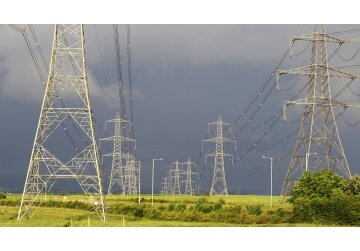
Reduced chance of winter power blackouts despite loss of coal back-up - grid operator
While Britain's electricity system operator is less worried than last winter, it warns that measures are still likely to be needed to balance supply and demand.
The risk of the lights going out is down this winter, with power margins almost back to levels seen before the energy crisis, according to an eagerly awaited report.
National Grid ESO's annual winter outlook, which assesses its own readiness for the coldest months of November to March, said it only saw a matter of minutes when the balance between supply and demand would not be met.
It forecast a margin of 7.4% capacity.
That means it expects to have 4.4 gigawatts (GW) of power in hand to meet its reliability standard.
The figure represents an improvement on the 6.3% (3.7 GW) that was expected this time last year when Russia's war with Ukraine - and sanctions to punish Russia for its invasion - squeezed gas supplies across Europe, forcing energy prices up to unprecedented levels.
Struggles for nuclear output in France last year also placed a greater strain on UK resources.
The latest report concluded, however, that the Grid was still likely to have to issue so-called "margin notices" over winter for periods when the supply-demand balance is especially tight.
These notices are calls for power generators to provide as much as they can to the network.
That was despite more domestic generation being available, the Grid said, along with increased levels of battery storage and the ability to share power with other nations including France and Belgium.
The operator will also have the Demand Flexibility Service (DFS), introduced last year, to fall back on again as an additional tool.
The scheme will see signatory households and businesses paid for turning off power-intensive appliances at times when power availability is stretched.
The DFS was utilised during a cold snap at the end of last winter following numerous test events that the Grid said had, when combined, saved enough electricity to power nearly 10 million homes.
Craig Dyke, the ESO's head of national control, said of the blackout risk: "Compared to last year it is almost going back to around where it was before last winter.
"So the risks that we talked about last year, the probability of them occurring, are much, much lower."
news.sky.com







